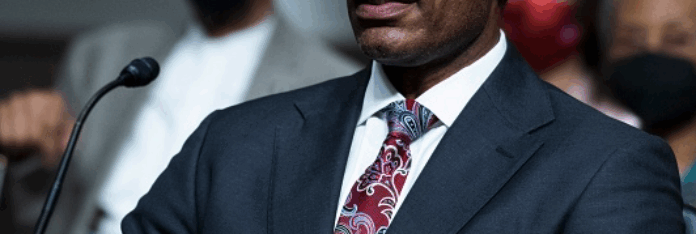So here we are again, folks—another day, another diversity hire melting down in real time. And this time, it’s happening in a federal courtroom.
U.S. District Court Judge Julien Neals, one of President Biden’s proudly touted judicial appointees, just had to withdraw an official opinion after an attorney pointed out it was packed with—wait for it—fake quotes and misattributed case law. Not typos. Not formatting issues. Full-on “this quote doesn’t exist in the case you cited” mistakes. And now, legal experts are floating the idea that the real author of the opinion may not have been human at all.
AI. Yes, that AI.
Let’s unpack this slowly, because it’s a bit like watching a car crash in slow motion: horrifying, predictable, and yet somehow impossible to look away from.
The opinion in question came down on June 30th, 2025. It was noticed almost immediately by attorney Andrew Lichtman, who took the rare—and bold—step of issuing a formal letter to Judge Neals pointing out not one, not two, but six separate errors in the opinion. These weren’t small potatoes. We’re talking quotes that never appeared in the cited legal cases. Entirely fictional language attributed to defendants. And factual reversals about case outcomes. Imagine citing a case where a motion was denied when, in reality, it was granted. That’s not interpretation. That’s fiction.
And yes, Lichtman brought receipts.
You don’t even need a law degree to fact-check it. As Lichtman basically said: just hit “Ctrl+F” and try to find the quotes. They aren’t there.
So what did Neals do?
He yanked the opinion. Quietly. A one-line notice appeared on the docket: “That opinion and order were entered in error.” That’s it. No public comment. No explanation. Just a silent walk of shame back into chambers.
Now let’s address the uncomfortable elephant tap-dancing around this mess: the suspicion that AI, not a human, actually wrote large parts of the opinion. Legal scholars and outlets like Bloomberg and The Volokh Conspiracy are openly speculating that Judge Neals—or more likely, one of his law clerks—used artificial intelligence and didn’t bother to check its work.
“Hallucinations” is the polite tech term for it. Regular people might just call it making stuff up.
Law professor Josh Blackman didn’t mince words. He suspects this isn’t a one-off. He believes judges all over the country are churning out ghostwritten AI opinions and rubber-stamping them without checking if the law they’re citing even exists. Sound far-fetched? Look around. How many overworked clerks do you think are quietly leaning on ChatGPT-style tools to cut corners—and how many judges are signing off without reading past the first paragraph?
DEI really gets the best of the best!
Judge Julien Neals, a Biden-appointed DEI federal judge is now under fire for issuing a legal opinion that contained made-up quotes and completely misstated case outcomes.https://t.co/xIAFNo6Zps
— Ann Coulter (@AnnCoulter) July 27, 2025
But wait—it gets better.
Judge Neals isn’t some rogue backbencher. He was handpicked. First by Barack Obama, and then proudly renominated by Joe Biden in 2021 as part of a very deliberate push to build a judiciary that looked like America—whatever that means.
Biden’s statement at the time didn’t talk about constitutional originalism or judicial restraint. No, no. It was all about race, gender, and being “the first.” First Muslim federal judge. First AAPI woman in D.C.. First woman of color in Maryland. Not first by merit—first by demographic category.
And now we’re living with the fallout.
It’s not just Neals. It’s the whole ideology behind his appointment. Remember Karine Jean-Pierre’s job interview? She introduced herself to the country with, “I’m a black, gay, immigrant woman.” That wasn’t her résumé. That was the résumé.
Biden made it clear from day one: qualifications are nice, but representation is the goal. He promised to nominate a black woman to the Supreme Court and delivered with Ketanji Brown Jackson—a jurist so legally unsound that Amy Coney Barrett had to gently remind her that the Constitution still exists.
Now we’ve got fake quotes showing up in federal court opinions. Law professors openly asking whether certain judges can be trusted to wield judicial power responsibly. And a system that seems far more concerned with optics than accuracy.
Diversity may “make us stronger,” as they like to say—but only if it comes after competence.
Judge Julien Neals, a Biden appointee, just withdrew a major ruling after lawyers exposed fake quotes and bogus case law—was AI to blame for the legal meltdown? pic.twitter.com/DwNB5mWj1q
— Robert Gouveia Esq. (@RobGouveiaEsq) July 26, 2025
Otherwise, we get exactly what we just saw in Neals’ courtroom: a botched opinion, a national embarrassment, and yet another reminder that identity politics can’t substitute for actual ability.
What else is being rubber-stamped from the bench? And how long before litigants start demanding their cases be heard by judges who actually read their own rulings?
There’s more to this story. And if this is just the first opinion to collapse under scrutiny, one has to wonder… what happens when someone really starts digging?







